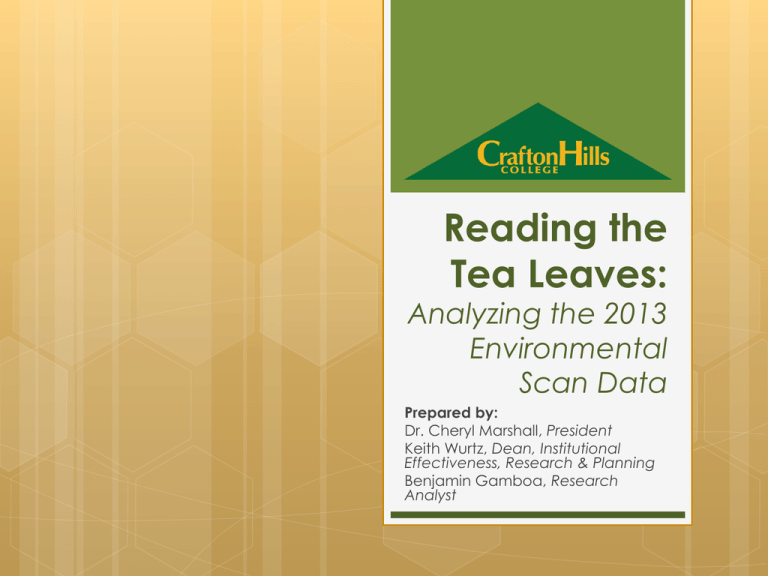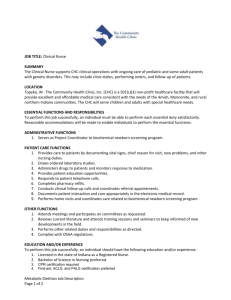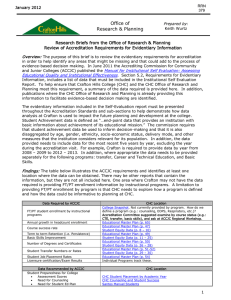Reading the Tea Leaves: Analyzing the 2013 Environmental
advertisement

Reading the Tea Leaves: Analyzing the 2013 Environmental Scan Data Prepared by: Dr. Cheryl Marshall, President Keith Wurtz, Dean, Institutional Effectiveness, Research & Planning Benjamin Gamboa, Research Analyst Objectives Review purpose and outcomes of environmental scans Summarize data from 2013 Madrid Environmental Scan Analyze implications from environmental scan data Environmental Scans: What are they? Include social, economic, labor and business data of the college’s service area Provide strategic information to stimulate ideas and dialogue in contexts of planning and decision-making Encourage college to be informed, responsive and proactive Data are informational – not prescriptive Typical Outcomes from Scan Data Establish enrollment baselines and targets Evaluate program offerings Determine demand in labor markets Develop marketing plans Target underserved students Cultivate partnerships and resources Assess other higher education institutions Identify areas for further study and analysis Demographics Demographics: Population While there is an overall forecasted 35% population increase through 2022… …there is a forecasted 13% decline in number of high school graduates (assuming a 25% dropout rate) through 2024… …and a projected 35% growth in number of high school graduates between 2024 and 2028 alone. Implications? Demographics: Ethnicity 49% of CHC service area population identifies as Hispanic Crafton has increased in Hispanic students every year since Fall 2003 by a total of 18% As of Fall 2013: 42% of Crafton Students were Hispanic 51% were Hispanic, African American, or Native American Implications? Demographics: Age CHC service area has a slightly higher average and median age than SBVC 17% of projected population are between the ages of 14 and 25 through 2017 62% of projected population will be 30 years old or older by 2017 Average age of CHC students in Fall 2013 was 24, and 73% of CHC students are 24 years old or younger; median age was 21 Implications? Demographics: Housing & Income 35% of the population in the CHC service area rent rather than own their home 12% of housing in CHC service area is vacant CHC service area has lower median household income ($54,853) than San Bernardino ($56,703) and Riverside ($59,109) counties. Implications? Demographics: Education Levels 22% of adults 25 years or older in CHC service area have less than a high school diploma 27% have a HS diploma or GED 24% have some college, but no degree Implications? Neighborhood Psychographics Psychographics: What is it? Study of personality, values, attitudes, interests, and lifestyles Data are merged with demographics to develop group profiles of otherwise seemingly dissimilar individuals Profiles are used by businesses and political campaigns for predicting consumer/voter habits and microtargeting advertisements Neighborhood Psychographics Environmental scan provides neighborhood psychographics, which are aggregated global profiles, within the CHC service area CHC service area is comprised generally of two major neighborhood profiles: Espaniola (44%) Urban Cliff-Climber (22%) Espaniola Consists of predominantly Hispanic neighborhoods with numerous complicated subsegments Median age ranges from the 20s to 40s Some high school to little-to-no college education Blue collar workers Rely on some level of public assistance Many households are married-with-children, but have high number of single-parent households Implications? Urban Cliff-Climbers Represents young working class in pursuit of their individual dreams Characterizing truism: “…you don’t have to be rich or have a college education to live a relatively good life.” Median age is 20-to-30-something Majority graduated from high school Some have gone to college (2 & 4 year); others used on-the-job-training to advance Employed in white- and blue-collar professions (management, protective services, sales, office administration, construction, maintenance, and healthcare) Comfortable middle-class urban lifestyle Married with some children under 13 years old Implications? Employment Industries Top 5 industries employing residents in CHC service area: Educational, health and social services (309,436) Wholesale and retail trade (240,164) Manufacturing (147,322) Agriculture, forestry, fishing and hunting, mining and construction (142,727) Arts, entertainment, recreation, accommodation and food service (130,870) Implications? Employers Top 10 employers in SB/Riverside Counties Stater Bros. Holdings Inc (16.5k) Prime Healthcare Svc Inc (15k) Chino Valley Medical Center Ontario Intl Airport (6k) Kaiser Permanente Medical Care (5k) Insurance Restoration Technologies Inc (5k) Jacuzzi Brands Corp (4.9k) San Manuel Indian Bingo & Casino (3k) Kaiser Permanente (3k) Medical Centers ESRI (2.7k) Del Taco (2.3k) Implications? Occupations Top 5 projected fastest growing occupations in SB/Riverside Counties, 2010-2020 Home Health Aides ($20.2k, Less than HS diploma) Veterinary Techs ($30.6k, 2-yr degree) EMT/Paramedics ($29.2k, Certificate) Market Research Analyst/Specialist ($56.6k, 4-yr Meeting, Convention & Event Planners ($43.4k, 4- degree) yr degree) Implications? Commute Time 60% of workers (16 or older) in CHC service area commute less than 30 minutes one way to work 88% of workers commute less than 60 minutes 95% of workers commute less than 90 minutes Implications? Unemployment Unemployment in San Bernardino County has significantly decreased in the past year from 12% in 2012 to 9.6% in 2013 (with a high of 14.2% in 2010). Unemployment in Riverside County tends to track slightly higher than San Bernardino County. Implications? CHC Market Share Market Share by Zip Code CHC captured the following percent of community college students in 2011-2012: Yucaipa (92399) – 68.5% Mentone (92359) – 67% Calimesa (92320) – 66.7% Redlands (92373/4) – 50.2% Beaumont (92223) – 32.7% Highland (92346) – 32.7% Implications? Market Share by Zip Code College Enrolled Students CCC Student Pop. % Average 9,368 12,590 74.4 SBVC 8,532 13,867 61.5 CHC 5,270 10,806 48.8 …which equals… % Lost Loss in FTES $ per FTES Total Loss to District 25.6 1,029.59 $4,676 $4,814,365.52 Implications? Market Share by Study Area In 2011-2012, CHC served 4.4% of the community college students living within the CHC study area RCC – 16% Chaffey – 14.4% Mt. San Jacinto – 12.3% Victor Valley – 10.3% SBVC – 9.9% Implications? Implications Based on the environmental scan, what are the implications for Crafton? Based on the environmental scan, are there any programs that Crafton should create or expand? Future Discussions Regional Workforce Development Trend towards regional programs for addressing student and labor market needs AB 86 State Chancellor’s Office Initiative Doing What Matters for Jobs and the Economy http://doingwhatmatters.cccco.edu/ WIBs – Employment Zones CTE Pathways Trust – RCCD Lead SB 1070 – Mt. SJC Lead Questions, Comments, Thoughts?



